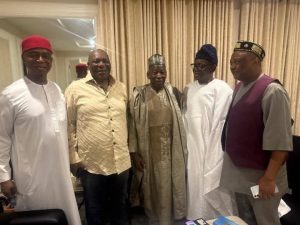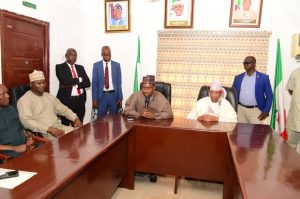News
Abuja residents in trouble as Doctors begin three-day strike

The Association of Resident Doctors, Federal Capital Territory Administration (ARD- FCTA) has commenced a three-day warning strike over unpaid salaries, allowances, and other demands.
The strike has disrupted activities in government hospitals in Abuja.
The President of ARD-FCTA, George Ebong, announced the commencement of the strike during a press briefing in Abuja on Wednesday.
Mr Ebong decried the neglect of hospitals and doctors’ welfare in the nation’s capital.
He noted that doctors in Abuja have become abandoned projects, calling on the Minister of FCT, Nyesom Wike, to intervene to avoid an indefinite shutdown of hospital activities.
He explained that the strike stemmed from a congress decision held on Tuesday, where the association expressed dissatisfaction with the government’s failure to meet previously agreed- upon demands, despite multiple dialogues.
“The three-day strike is being implemented across all government hospitals in Abuja. From Wuse to Asokoro, Maitama, Kubwa, Zuba, Kwali, Abaji, and Nyanya, and other hospitals in Abuja,” he said.
He said the association gave the government an ultimatum to meet its demands, after which they met and dialogued on several occasions.
He, however, said nothing has been done, not even the minimum thing.
The resident doctors comprise the bulk of medical personnel in Nigeria’s tertiary hospitals; hence health activities are mostly crippled when they are on strike.
Key grievances
Among other unresolved issues is the six months of unpaid arrears for doctors.
“We expected them to pay for the six months of unpaid arrears to doctors. Honestly, doctors have been abandoned projects,” he said.
Mr Ebong said the promises made on accoutrement allowance had not been fulfilled.
“This allowance, meant for the tools we use daily to serve Nigerians, has also been delayed indefinitely. Management assured us this money can be paid, but to date, nothing has been done,” he said.
He explained that these broken promises make it harder for doctors to trust the system.
The association’s president added that doctors who have been promoted are still receiving salaries based on their previous positions, despite having assumed more responsibilities for years.
“Imagine passing a promotion exam years ago, in our case 2-5 years, taking on the responsibilities of your new role, but still being paid for your old position,” he said.
“This is our reality. Doctors who have earned the title of “consultant” are still treated as senior registrars, with no formal recognition or financial benefits. It is a slap in the face to our hard work and commitment.”
He also highlighted the unmet promise of increased hazard allowances, which were approved following the increased risks of diseases like COVID-19 and Lassa fever.
He said the doctors in FCT are still owed 13 months of arrears.
Mr Ebong noted that if nothing is done regarding the doctors’ demands after the three-day strike, they will conduct an appraisal.
“If nothing is done, we will go on an indefinite strike. We want the Minister of FCT to solve this problems to avert an indefinite shutdown of the hospitals in Abuja,” he said.
Read the full communique:
ARD FCTA EMBARKS ON 3-DAY WARNING STRIKE—A CALL FOR URGENT ACTION*
Good day, ladies and gentlemen of the press,
We stand here today, not with joy but with heavy hearts. We, the Association of Resident Doctors, Federal Capital Territory Administration (ARD FCTA), have been left with no other choice but to embark on a three-day warning strike. This decision was not made lightly. It comes after countless meetings—formal and informal—with those in positions to resolve these issues. Despite our efforts, these problems remain unresolved, forcing us into this position to draw attention to the plight of doctors and, ultimately, the Nigerian healthcare system.
Our story is one of perseverance amidst hardship, but there is only so much one can bear.
Unpaid Salaries (1–6 Months): A Breach of Trust
It is painful and deeply disheartening that in the capital city of Nigeria, the heartbeat of our nation, doctors are being owed salaries for up to six months. Think about that. Six months of working tirelessly, day and night, with no pay. Many of our colleagues have resigned, not because they want to leave, but because they’ve been pushed to their limits. They’ve left for other countries, seeking dignity and survival.
We are already struggling with a manpower shortage—one doctor is often forced to do the work of five. Yet, instead of easing our burden, the system keeps pushing us to the brink. Those who remain are mocked for staying. But how can we stay when we can’t afford rent, school fees, or even food?
Medical Residency Training Fund (MRTF): A Right, Not a Favour
The MRTF is meant to assist resident doctors with the enormous cost of professional exams, which can run into millions of naira. Yet, here in the FCT, we are still struggling to receive the fund for 2024, while other centres are already preparing to receive their 2025 allocation. This fund is not a luxury—it is a necessity that helps doctors improve their skills for the benefit of their patients.
When will we stop treating basic entitlements like privileges?
Accoutrement Allowance: Promises Unfulfilled
This allowance, meant for the tools we use daily to serve Nigerians, has also been delayed indefinitely. Management assured us this money can be paid, but to date, nothing has been done. These broken promises make it harder for us to trust the system.
Conversion: Denying Our Worth
Imagine passing a promotion exam years ago, in our case 2-5 years, taking on the responsibilities of your new role, but still being paid for your old position. This is our reality. Doctors who have earned the title of “consultant” are still treated as senior registrars, with no formal recognition or financial benefits.
It is a slap in the face to our hard work and commitment. How do we encourage doctors to stay and train in Nigeria under such conditions? Is it any wonder that so many are leaving for countries where their skills are valued?
Unpaid Hazard Allowance: Neglecting Our Sacrifice
Since 2021, there was an increase in our hazard allowance—an increase approved due to the high risks we face daily. From COVID-19 to Lassa fever, we work on the frontlines, often at great personal risk. Yet, here in the FCT, we are still owed 13 months of arrears.
Is this how we show gratitude to those who put their lives on the line?
Manpower Shortage: A Recipe for Disaster
Doctors are leaving Nigeria in droves, and yet no effort is being made to replace them. This has left the rest of us overworked, burnt out, and struggling to keep the system afloat. We are losing colleagues to stress and exhaustion. We can’t continue like this.
Replacing doctors as they leave is the bare minimum. Without urgent action, our healthcare system will collapse.
THE TRUE STATE OF OUR HOSPITALS AND WHY WE CAN’T CONTINUE THIS WAY:
We have the skills, knowledge, and dedication to deliver excellent healthcare. We have some of the best-trained brains in the medical field. But the truth is, we are working under conditions that are nothing short of appalling.
Hospitals in Decay, Working With Outdated Equipment
Our hospitals are struggling to function with equipment that should be in museums, not in operating rooms. Many of the tools we use were purchased decades ago—some from when I was still in my mother’s womb. They’ve seen no updates, no replacements, and minimal maintenance.
Doctors have now become technicians. We spend as much time fixing broken operating tables and machines as we do saving lives. Oil is constantly applied to squeaky operating tables to keep them functional. Our theatres are held together by improvisation. Our wards are even worse off, with no BP apparatus, not even little things like thermometers or weighing scales, not to mention ventilators and the like.
This is the Federal Capital Territory, yet our hospitals lack basic amenities. Equipment fails mid-procedure, jeopardising lives. How can we offer modern healthcare with tools that belong to a bygone era?
Overcrowding and Burnout: A Recipe for Disaster
Hospitals built to handle 50 beds are now forced to accommodate hundreds of patients daily. Imagine a facility seeing over 5,000 patients a month, performing more than 100 Caesarean sections monthly, with just one consultant and two to three medical officers in the department.
This is beyond capacity, yet doctors are expected to keep pushing. The system is stretched thin, and so are we. When there are no beds, no power for surgeries, no consumables, and no drugs in the pharmacy, patients understandably grow frustrated. But the blame unfairly falls on doctors when it is the government’s failure to provide these essentials.
Hospitals Without Water: A National Embarrassment
Perhaps one of the most shameful realities is that some hospitals in the heart of Abuja—the seat of power—have gone months without water. Yes, you heard that correctly: no water to clean operating rooms, wash hands, or even flush toilets.
Members of our association have shared heartbreaking stories of being forced to defecate or urinate in isolated areas of the hospital because there was no other option. This is not just humiliating—it is a public health hazard. How do we protect ourselves and our patients from deadly diseases when we cannot access something as basic as water?
Doctors Carrying the Burden of a Broken System
Despite these horrendous conditions, we show up every day to do our best. We work long hours, sacrificing our own health and well-being, only to face criticism and blame for systemic failures. When we tell patients there’s no bed, no equipment, or no drugs, the response we often hear is, “Doctors are wicked.”
But let me ask: are we the ones who should be providing beds, light, consumables, and medications? Or is it the government’s responsibility?
The Toll on Our Mental and Physical Health
Doctors are humans too. We are tired, burnt out, and demoralised. We work in an environment where the odds are stacked against us, and no one seems to care. We cannot continue like this.
A Call for Urgent Action
We are striking because we have no other choice. This is not just about salaries or allowances—it is about ensuring that our hospitals can function, that we can work with dignity, and that patients can receive the care they deserve.
We Are Not Fighting for Luxuries, but Survival
Many believe doctors are always demanding money, but this is not about greed—it’s about survival. No Nigerian can go six months without pay. No professional should work 36-72 hour shifts without rest because there are no replacements.
Doctors are human too. We face the same struggles as every Nigerian—rising costs of living, school fees, and basic family needs. How can we care for others when we are unable to care for ourselves?
A Plea to Nigerians
We are not the enemy. This fight is for all of us. A broken healthcare system affects everyone. Before asking us to “consider the poor masses,” we ask you to consider that we are also part of the poor masses.
Our hope is that this warning strike will force the authorities to act. We cannot continue to suffer and smile.
To the public, we plead for your understanding and support. To the government, we demand urgent action. The time to act is now, before it is too late.
Nigerians deserve better. Doctors deserve better.
Thank you.
Dr. George Ebong
President, ARD FCTA
Premium Times
News
Senator Manu donates five operational vehicles to Taraba PDP(Photos)
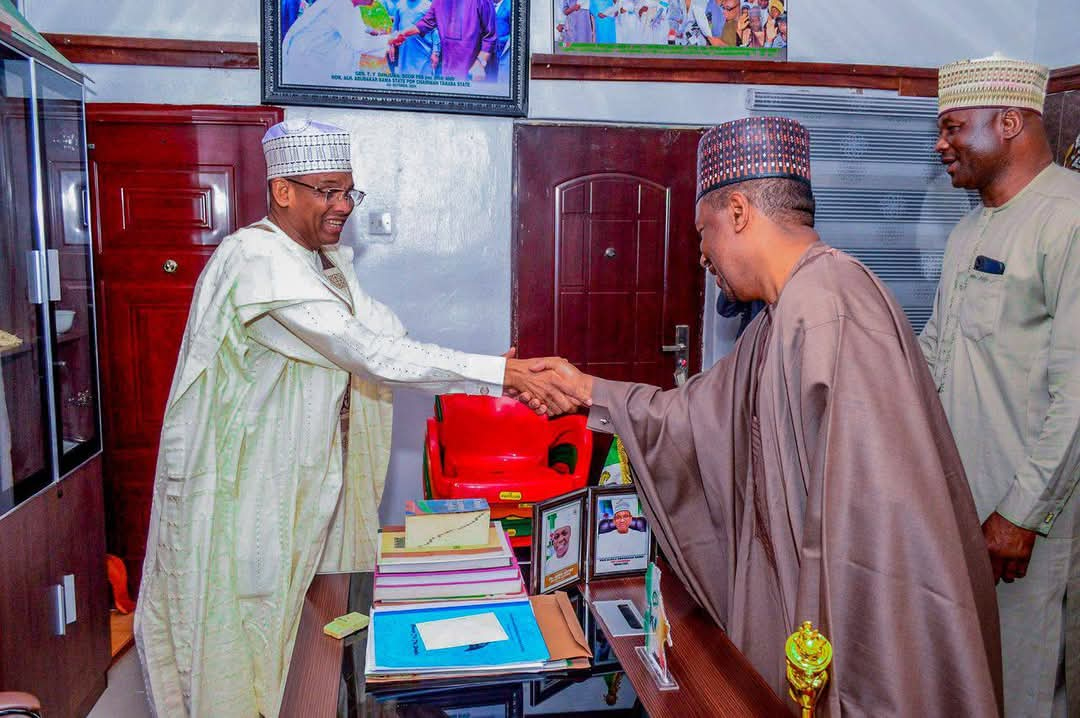
…hails emergence of Bawa as state chairman
The Senator representing Taraba Central Senatorial District Senator Manu Haruna on Sunday donated five operational vehicles to Taraba Peoples Democratic Party, PDP to enhance its operations.
Manu also seized the opportunity to congratulate the state Chairman, Hon Abubakar Bawa when he visited the secretariat in Jalingo last Sunday.
The former State Deputy Governor expressed his congratulations to Chairman Bawa and the state working committee for their election, emphasizing the importance of unity and progress within the party. He commended their commitment to strengthening the People’s Democratic Party (PDP) in Taraba State.
In a generous move to enhance the operational capacity of the party at the grassroots level, Senator Manu donated five vehicles — one for each Local Government Area (LGA) party chapter in Taraba Central.
This donation is intended to facilitate better coordination and outreach efforts within the party.
Senator Manu praised Hon. Abubakar Bawa for his dedicated efforts to elevate the PDP in the state, asserting that Taraba will always remain a stronghold for the party.
In response, State Party Chairman Alhaji Bawa expressed his heartfelt gratitude to Senator Manu for his thoughtful visit and generous donation. He acknowledged the impact of such contributions on the party’s progress and reemphasized the commitment of the PDP to serve the interests of the people in Taraba State.
News
Justice Minister, Fagbemi seeks support for govt’s national law reform initiative
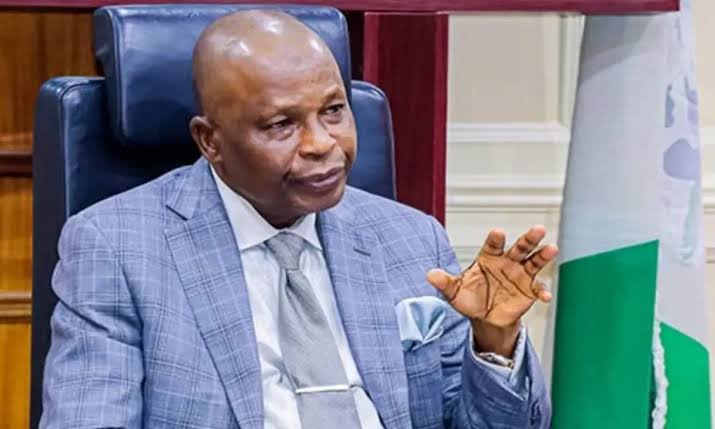
By Francesca Hangeior
The Attorney General of the Federation and Minister of Justice, AGF, Prince Lateef Fagbemi, SAN, has canvassed for greater efforts and commitments to the Federal Government’s aspirations to produce a workable legal framework for the country.
He charged the Committee put in place by the federal government to review, revise and consolidate the Laws of the Federation of Nigeria, LFN, to double the efforts and commitments to deliver on the mandate at the appointed time.
Fagbemi, a Senior Advocate of Nigeria, spoke on Monday in Abuja at the second retreat of the Committee put in place in October last year for the laws of the federation revision and reform.
The AGF while challenging the committee to be up and doing asked the members to remain united in purpose and steadfast in the resolve to produce a legal framework that is worthy of the nation’s aspirations.
He said the second retreat organized by the federal government was a strategic consolidation of the national law reform efforts and to provide an invaluable opportunity to come up with a better workable legal framework for the nation.
“Let me start by expressing gratitude to the Chairman, Co-Chairperson and members of the Committee for their selfless service and sacrifice, to ensure that this project is executed efficiently and effectively.
“The call to be part of this assignment is indeed a sacred that inevitably and positively affects the lives of individuals, government, businesses as well as citizens of this nation.
“The general purpose of law is to regulate human behavior by protecting lives and properties in society. The inauguration of the Committee on the 24th October, 2024 marked a historic milestone in our collective efforts to modernize, consolidate, and harmonize Nigeria’s body of federal statutes.
“The retreat successfully provides a clear framework for the structure and methodology of the revision exercise, oriented the 14 Working Groups tasked with reviewing specific legal subject areas, and fostered collaboration among key institutions and stakeholders on the project.
“Following the initial retreat, I wish to note that the Committee has recorded steady progress in its work.
“The Ministry has taken several measures to ensure that the assignment is delivered efficiently, including:training sessions for secretaries of the working groups to enhance documentation and coordination; technical meetings of the main committee and its various sub-committees; working sessions and deliberations among editors and reviewers; and ongoing technical collation of revised laws by the Secretariat.
“This second retreat is a strategic consolidation of our national law reform efforts and provides an invaluable opportunity to: review progress made since the first phase;
address any technical or structural challenges encountered during the collation process;
– Harmonize the output across working groups; and set the tone for the final stages of this important project.
“The next stage of the law review and consolidation process would include editing and proofreading the reviewed legislation, ahead of the final collation, production and printing of the laws of the federation.
“It is my conviction that these phases will be executed with even greater commitment by the Committee, with the support of stakeholders and development partners.
“I wish to commend the leadership of the LFN Committee, the Secretariat for its diligent coordination and day-to-day management as well as the Working Groups, Editors, and Reviewers, for their intellectual rigour and professionalism.
“Special gratitude to our development partners, particularly RoLAC, for standing firmly behind this national project.
“Let me urge all participants to use this retreat as a platform for robust engagement, peer learning, and practical collaboration.
“We must remain united in purpose and steadfast in our resolve to produce a legal framework that is worthy of our nation’s aspirations.
” I wish to express gratitude for your commitment to duty and I charge you to work in synergy and cooperation, in the overall interest of the nation”, the AGF said.
News
You must refund N300m, Rivers State tells NBA
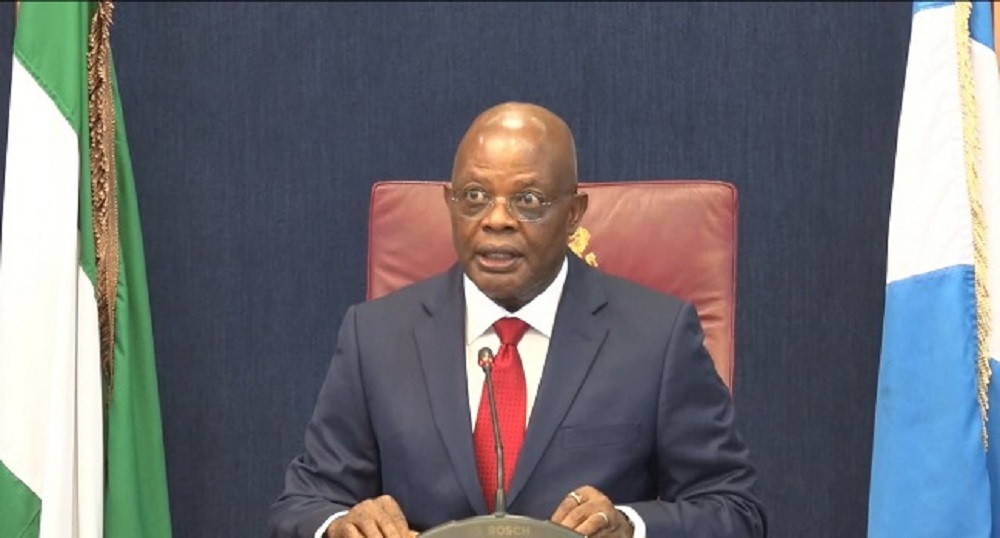
The Rivers State Sole Administrator, Vice Admiral Ibok-Ete Ibas (retd.), has replied to the Nigerian Bar Association regarding the reason for relocating its Annual General Conference from Port Harcourt to Enugu State.
Ibas faulted the reason cited by the NBA, describing it as misleading and uncharitable.
The Sole Administrator stated this in a statement issued in Port Harcourt on Monday by his media aide, Hector Igbikiowubo, and sent to newsmen.
He said while the NBA reserves the right to choose a venue for its conference, the association had yet to address the issue of the refund of the hosting rights paid by the state government for the conference.
The statement partly reads, “While we respect the NBA’s right to choose its conference venues, we find it curious that the association—despite its “principled position”— didn’t address the refund of the N300 million already paid by the Rivers State Government for the hosting rights of the 2025 conference.
“If the NBA truly stands on principle, it should demonstrate the same integrity by promptly returning these funds rather than benefiting from a state it now publicly discredits.”
It added, “The attention of the Rivers State Government has been drawn to the Nigeria Bar Association’s announcement dated 10th April 2025, relocating its 2025 Annual General Conference from Port Harcourt to Enugu.
The statement partly reads, “While we respect the NBA’s right to choose its conference venues, we find it curious that the association—despite its “principled position”— didn’t address the refund of the N300 million already paid by the Rivers State Government for the hosting rights of the 2025 conference.
“If the NBA truly stands on principle, it should demonstrate the same integrity by promptly returning these funds rather than benefiting from a state it now publicly discredits.”
It added, “The attention of the Rivers State Government has been drawn to the Nigeria Bar Association’s announcement dated 10th April 2025, relocating its 2025 Annual General Conference from Port Harcourt to Enugu.
-

 News23 hours ago
News23 hours agoAutonomy: 774 LGs challenge FG, states in court Tuesday
-

 News16 hours ago
News16 hours agoJust in: Namibia Moves to Deport Over 500 Americans in Bold Visa Policy Shift
-

 News16 hours ago
News16 hours agoRivers women rally in support of state of emergency
-

 News11 hours ago
News11 hours agoYou must refund N300m, Rivers State tells NBA
-
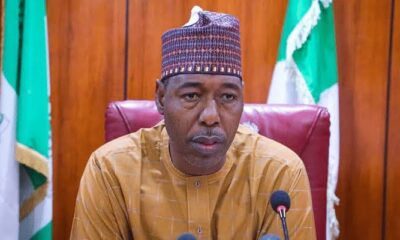
 News23 hours ago
News23 hours agoZulum orders arrest, offers house, scholarship to abused boy in viral video
-

 Politics14 hours ago
Politics14 hours agoBwala accuses Senator Ndume of plans to defect from APC
-
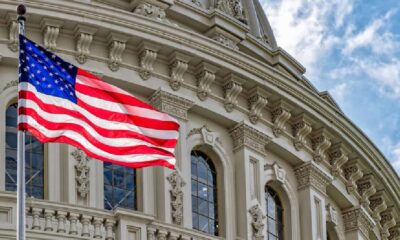
 Foreign12 hours ago
Foreign12 hours agoUS orders 30-day registration for all foreign nationals or face jail, deportation
-
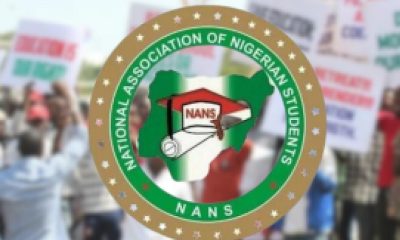
 News24 hours ago
News24 hours agoNANS criticize NASS over proposed bill to fine, jail non voters














